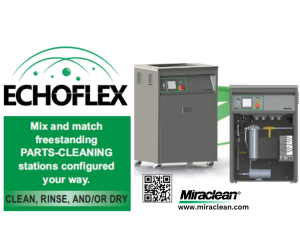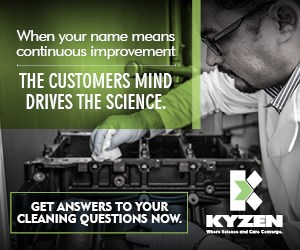TCE Acid Acceptance
What are a good acid acceptance test kit and acid stabilizer for trichloroethylene?
Q. Can you please recommend a test kit (acid acceptance test) and a known acid stabilizer for trichloroethylene? —A.P.
A. I would strongly recommend talking to your supplier of trichloroethylene (TCE). It is important that you use an inhibited vapor degreaser grade of chlorinated solvent, otherwise you will risk it going acid. Each supplier generally has a proprietary inhibitor chemistry for their metal cleaning solvents that may be a mixture of epoxides and amine compounds.
The test kits will often indirectly measure the acidity of these chlorinated solvent by means of an extraction. In this case you will mix your used TCE sample with a similar volume of deionized water. You will decant the water from the top (or the solvent from the bottom using a separatory flask), then measure the pH of the water phase and likely perform a titration to determine the level of acid acceptors remaining. You will want to insure you maintain the supplier’s procedures, because if the chlorinated solvent does “go acid,” it may be bad enough to generate hydrochloric acid fumes causing you to stop production and evacuate your plant. Unfortunately, the reaction is autocatalytic and will not stop until you have provided sufficient base (sodium bicarbonate) to neutralize the system.
Related Content
-
From Drain to Gain with Smart Wastewater Recovery
Incorporating digital monitoring to maximize performance.
-
3-Stage Versus 5-Stage Washers
Columnist Rodger Talbert explains the difference between a five-stage washer and a three-stage washer, and how one provides better corrosion protection over the other.
-
Advantages to Pumped Eductor Agitation
Not all agitation methods are created equally. Pumped agitation with eductor nozzles can improve process tanks and quickly show a reduction in operating costs while keeping staff safe, following environmental legislation and preventing pollution.













